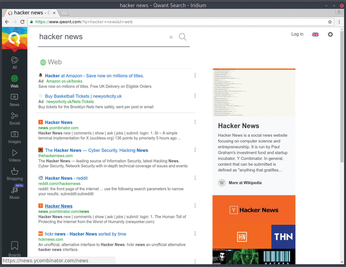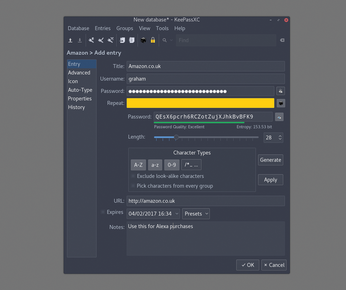Graham searches for the best new free software
Iridium
There are many things to love about Google's Chrome browser. It works with almost every site; it's about the best performing, full-fledged browser I've used; and it's secure, thanks to a constant stream of updates. But there's one thing you can't quite trust in Chrome, and that's its privacy credentials. Fortunately, like Android, the core of Google Chrome is open source and can be merged and built into other projects. Chromium, for example, is an open source version of Google Chrome. But this also means the source code can be taken, changed, and rolled into a completely new project, which is exactly what the Iridium browser is.
Iridium is a web browser for modern times. Every modification made to the open source code base has been made to enhance the privacy of the user, and it does this without sacrificing Chrome's speed or ease of use. The project's GitHub page lists the changes made to the Chromium code, and these include always sending the Do Not Track header, changed default search, blocked third-party cookies, disabled battery status API, no password saving, and many more. Additionally, many of Google's embedded services have been disabled, too. These include cloud printing, embedded hot words, translation features, and automatic update check. All this means you get the best of Chrome, offering the latest web technologies such as WebRTC, without many of the features and services that could compromise your privacy. And although many of these options can be changed within both Chrome and Chromium, it's reassuring to know a skilled set of developers have created a set of baked-in defaults that should help the majority of us reclaim our privacy.
Project Website

Password Manager
KeePassXC 2.1.0
Password security is still a nightmare, and no one has really come up with a better solution than having a strong, randomly generated password for each site or service you use. This of course makes remembering them impossible, which is why password managers exists. But putting all your passwords into the same virtual pocket is the encryption equivalent to putting all your eggs in one basket. One mistake and you've lost everything. This is why open source password managers are so important. My favorite is a tool called "pass," which uses a normal filesystem layout of folders and files, alongside your GnuPG key, to secure your information in plain site. But another popular option is KeePassX, a GPL Linux port of the same tool on Windows and OS X.
Unfortunately, the original port of KeePassX has stalled, with lots of written and proposed new features and bug fixes being kept from the main project's repository – there were 69 opened pull requests without maintainer comment waiting to be merged, for example. This feature stalling has led to KeePassX to be forked into a new project called KeePassXC, which now includes all the stalled features and fixes along with a renewed vigor to provide users with the best password manager for your systems. The new application looks the same and has the same database management with hooks to your browser. It also opens and saves a 2.x compatible database, so you can switch between the two applications if you've not yet got the confidence with the new version. But because the new application includes a fantastic password generator, complete with strength meter for your own, favicons for website entries, and the ability to merge databases that can reload when there's a change, I don't see any immediate reason to go back to the old pre-fork version.
Project Website

Buy this article as PDF
(incl. VAT)
Buy Linux Magazine
Subscribe to our Linux Newsletters
Find Linux and Open Source Jobs
Subscribe to our ADMIN Newsletters
Support Our Work
Linux Magazine content is made possible with support from readers like you. Please consider contributing when you’ve found an article to be beneficial.

News
-
Canonical Releases Ubuntu 24.04
After a brief pause because of the XZ vulnerability, Ubuntu 24.04 is now available for install.
-
Linux Servers Targeted by Akira Ransomware
A group of bad actors who have already extorted $42 million have their sights set on the Linux platform.
-
TUXEDO Computers Unveils Linux Laptop Featuring AMD Ryzen CPU
This latest release is the first laptop to include the new CPU from Ryzen and Linux preinstalled.
-
XZ Gets the All-Clear
The back door xz vulnerability has been officially reverted for Fedora 40 and versions 38 and 39 were never affected.
-
Canonical Collaborates with Qualcomm on New Venture
This new joint effort is geared toward bringing Ubuntu and Ubuntu Core to Qualcomm-powered devices.
-
Kodi 21.0 Open-Source Entertainment Hub Released
After a year of development, the award-winning Kodi cross-platform, media center software is now available with many new additions and improvements.
-
Linux Usage Increases in Two Key Areas
If market share is your thing, you'll be happy to know that Linux is on the rise in two areas that, if they keep climbing, could have serious meaning for Linux's future.
-
Vulnerability Discovered in xz Libraries
An urgent alert for Fedora 40 has been posted and users should pay attention.
-
Canonical Bumps LTS Support to 12 years
If you're worried that your Ubuntu LTS release won't be supported long enough to last, Canonical has a surprise for you in the form of 12 years of security coverage.
-
Fedora 40 Beta Released Soon
With the official release of Fedora 40 coming in April, it's almost time to download the beta and see what's new.

